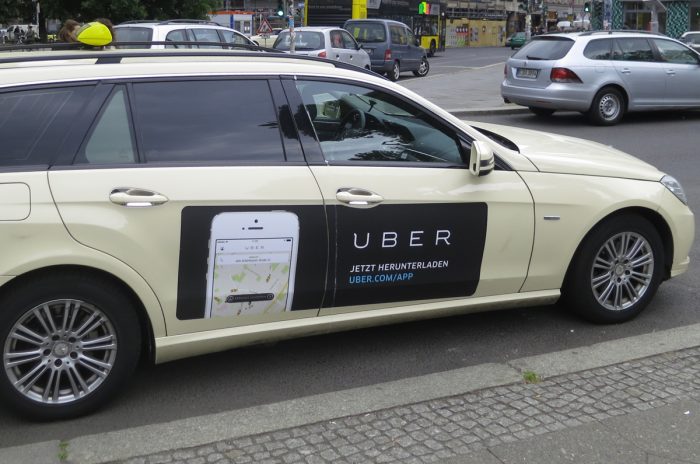
Photo: Alper Çuğun, via Flickr
This post pulls together everything I’ve had to say on the subject of how ride-sourcing companies like Uber could impact cities. Hope to leave this topic for a while.
Henry Grabar at Slate has a good piece on an issue that I havebeenraisingthe alarmabout for a while.
The rise of ride-hailing companies is increasingly viewed not as a fix for bad service but as its justification. It is invoked, as you might expect, in bad faith by [people] who have advocated against public investment for decades. But even pro-transit politicians and officials have begun to see ride-hailing services as an acceptable substitute for public transit. As a result, cities across the country are making important decisions about transportation that treat 10-year-old companies as fixed variables for the decades to come.
Regardless of their corporate intentions, Uber and its ilk are doing harm to transit — and thus to transit-reliant dense cities — in two ways: one in the politics, the other in the reality of competition on the ground.
- Politically, as a working consultant, I can confirm Grabar’s observation that “Uber” is becoming as a generic reason to let transit fall apart. I am constantly told that Uber will make transit obsolete. As Grabar notes, some of this is just easy rhetoric for people who dislike transit for cultural reasons, or who oppose public investment of any kind. But much of the confusion arises because people sincerely don’t understand how narrow the range of opportunities is for ride-sourcing to improve on fixed route transit’s efficiency. Even an empty-looking suburban fixed route bus is usually doing over 10 boardings/hour, way more than you could ever do in any taxi-like mode that’s taking people to their door.
- Competitively. We know Uber is unprofitable, which means its prices are unsustainable. As always, unsustainable means: “It would be folly to plan your city around the assumption that this will continue.” We are not sure exactly how unsustainable Uber is. Grabar cites an analysis by Hubert Horan that suggests Uber may be covering as little as 41% of its costs with fares, but Bloomberg’s Eric Newcomer thinks that reflects one-time losses from their failure in China. More journalists need to be digging into this. People making urban policy need to know whether the “Uber” that people experience is a permanent thing in the landscape, because a belief in permanence is essential to planning and development.
These two strands converge in the geometry problem that is at the core of urbanist alarm: If travelers shift from larger vehicles (like buses) into smaller ones (like Ubers) you increase Vehicle Miles Travelled, which increases congestion, emissions, and the demand for road space. This is tolerable in low-density areas but an existential threat to dense cities. None of these would be problems if the higher cost of smaller-vehicle services reflected the true cost of their inefficient use of space. But as we know, cars’ inefficient use of urban space is rarely reflected in the cost of urban driving, and Uber skates through on the same invisible subsidy that all urban motorists enjoy. Transit, which doesn’t enjoy any such subsidy, is unable to properly reflect its efficient use of space in its pricing.
I’m sure that someone’s going to say that “Uber isn’t trying to damage transit.” That’s not a response to any of these issues, because the issue is not intent but outcomes. Uber’s behavior often looks like an intentional effort to undermine competitors and thus reduce customer choice — in which case you’d call it predatory pricing— but it doesn’t matter what the intention is. Underpricing is a blunt weapon with zero targeting ability. It mows down everything in its path.
Obviously, Uber is doing what all companies do, including trying to limit competition. There’s no point in criticizing them in particular for that. Such a critique would have to be leveled at all the underlying assumptions of American capitalism.
And there’s no doubting the value of these companies in the lives of fortunate people who can afford to use their services routinely, or that they have positive roles to play in parts of the urban transportation picture, such as low-demand areas.
But it’s time to quit discussing Uber and similar companies as though they were improving the world in a permanent way, and as though they will necessarily make cities better for everyone. We already know that’s not true. Governments need to regulate to expand the opportunities these companies, but must also respond to threats that they pose.
All this can be done very politely, by the way. Many people who work inside of big companies understand perfectly well how the profit motive conflicts with what you’d do if you were just trying to foster a better city, and many welcome regulation precisely to plug that gap.